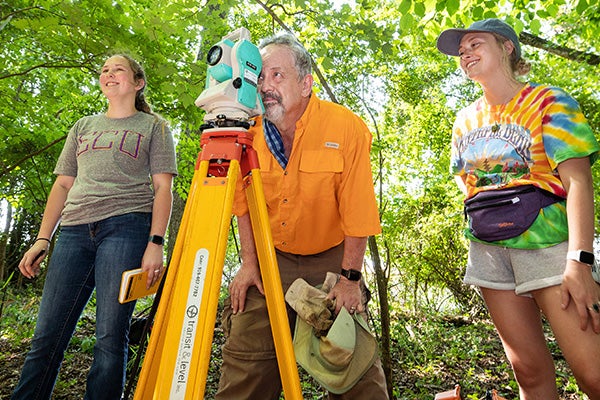ECU anthropology course questions pseudoscience in search for solutions
Binge-watching lists for the holidays might include a new Netflix series that proposes survivors of an ice-age cataclysm fanned out across the globe and influenced civilizations from the Andes to Indonesia.
And if you’ve taken anthropology 1001 at East Carolina University, you’ll likely pick apart the arguments from start to finish.
MORE ON ANTH 1001
Along with its in-person course offerings, ANTH 1001 is taught online to nearly 150 students during the spring and fall semesters and 50 Pirates during the summer. The course also meets ECU’s social science general education credit.
The show is Graham Hancock’s “Ancient Apocalypse.” The eight-part series is based on ideas presented in the best-selling author’s books, such as “Fingerprints of the Gods” and “Magicians of the Gods.” It premiered Nov. 10 and quickly became the streaming service’s second-most popular program, garnering 25 million viewers. It has ranked in the weekly top 10 at least once in 31 countries.
In the series, Hancock argues a disaster destroyed an advanced civilization about 12,000 years ago, but its survivors introduced agriculture, monumental architecture and astronomy to hunter-gatherers around the world. Numerous ancient monuments, he says, are evidence of this lost civilization’s influence, and it’s being covered up by “big archaeology.”
“Like that’s a thing,” said Charles Ewen, an archaeologist and professor of anthropology who has been teaching “Aliens, Atlantis & Archaeology: Pseudoscience and Interpretations of the Past” at ECU for about 15 years. “I tell my class, ‘Look, some of these guys are telling you the archaeology community is suppressing these discoveries.’ And I say, ‘Why?’ This would make my career. Besides we’re not that organized. Somebody would blab.”
ANTH 1001 enrolls 120 students in each section each semester. Laura Mazow, an associate professor of anthropology and expert in the ancient Middle East, also teaches it.
“Anyone I’ve heard who has taken it has really enjoyed it, and a lot of students who haven’t have said they tried to get into it, but the class was completely full,” said Elise Bryan, a sophomore from Raleigh who took the class with Ewen last year then changed her major from math to anthropology. “I took it because it sounded interesting, and I think it counted as a (general education course). It was fun. Even just listening, it was fascinating. If I hadn’t taken that class, I wouldn’t have changed to anthropology.”
Critical thinkers
Jack Potter, a sophomore from Greenville, also picked anthropology as a major after taking ANTH 1001 and later did an archaeology field school with Ewen.
“My favorite part of ANTH 1001 would have to be learning about pseudoscience,” Potter said. “I would say the class pushed me to look at all the factors in a situation when determining my thoughts on it.”

Anthropology professor Charles Ewen, center, works with students Mackenzie Mulkey and Regina Wheeler to locate and document gravesites at an abandoned cemetery in Ayden in 2021. (Photo by Rhett Butler)
Pseudoscience includes statements, beliefs or practices that claim to be scientific and factual but don’t stand up to the scientific method. Such as the idea a continent called Atlantis existed in the middle of the ocean. Ewen said the class is really a critical-thinking course.
“In fact, I could have called this class ‘Critical Thinking and Archaeology,’ but who’d take that?” he said with a laugh.
And yes, the class covers the notion that aliens helped ancient Egyptians build the pyramids. In rebuttal, Bryan points out some early pyramids were flawed and collapsed. “So it’s like well, if aliens built it, they wouldn’t have had these … that didn’t work,” she said.
Back to the Netflix series. Ewen had dinner with Hancock several years ago when the professor was part of a panel discussion of Hancock’s book “Magician of the Gods” at Greensboro College. “He’s an interesting guy, very charming,” he said. And Ewen acknowledges archaeologists don’t do a good job of telling their stories, leaving a vacuum for fantastic alternatives, such as Hancock’s.
“We say, ‘Read my 200-page book. Read my journal articles.’ That’s not a good response,” said Ewen, who’s a past president of the Society for Historical Archaeology. “If we want to reach the people, we’ve got to go where they are.”
For example, Ewen has appeared on documentaries exploring popular concepts such as pirates and the Lost Colony. “Because one of those shows will reach more people than everything I’ve ever or will ever write,” he says.
And at ECU, he and Mazow are reaching students by the lecture hall.